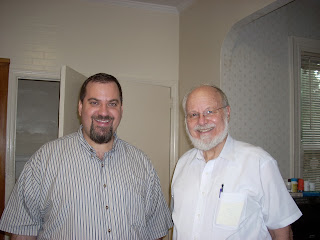Why do we still fast on Tisha B'Av?
From 2010 (slightly edited):
There are voices that assert that we should no longer fast on Tisha B'Av, that if we wanted to rebuild the temple, we could simply do so, and that with a rebuilt Israel and a rebuilt Jerusalem, Tisha B'Av should be obsolete.
These people certainly have a point. It’s ironic to see people who live in fancy houses in Flatbush, travel to Israel on El Al several times a year, and have full religious freedoms in America begging Hashem to “end the terrible golus!”
But there’s another way of looking at it, and it’s the way I choose to look at many of our traditions. What we commemorate on Tisha B’Av isn’t just the loss of the Temple. It isn’t just a yearning for the Beit HaMikdash to be rebuilt and for sacrifices and a monarchy to be reinstituted. To tell the truth, how likely, practical, or even desirable does that really seem?
Instead, it's about something much bigger. We fast because we’ve fasted for 2,000 years. We mourn for the very real people who died for being Jews throughout our long history. We fast because our parents, their parents, and their parents fasted. Looking at the tragedies of Judaism, we also gaze at our rich and varied history.
There’s a myopia sometimes, in the way that many frum people look at Judaism. It’s a focus on a history that ended 2,000 years ago, and a focus on a future that has not yet come. There’s a lack of internalizing the richness of our history and of how Judaism (and Jews) changed and evolved and grew for millennia. It’s as if all of that time was just a holding pattern and is only religiously significant in terms of what came before and the hope of what will come.
The exile created the Judaism we have today. It’s a far different religion, and we’re a far different people, than what we were in the year 70 AD. Part and parcel of that religion is fasting on Tisha B’Av. It’s not just about the destruction, it’s about who we are now, who we were 100, 500, and 1,000 years ago. The kinot we read aren’t just about the destruction. They’re also about the time they were written in, the beautiful poetry of Eliezer HaKalir in the early medieval period or the ones written in the wake of the tragedy of our times, the Shoah.
It’s also about hope. People claim that since Eretz Yisrael is under Jewish control and we could rebuild the Temple should we choose, there’s no need to fast. But as I wrote above, yearning for the redemption isn’t just about the Temple and the monarchy. Instead, it’s about yearning and hoping for a world at peace, where war and hate are no more. It’s a vision that can transcend sectarian differences and is unencumbered by petty differences of theology. Instead it’s about hope.
And that’s why we fast.
There are voices that assert that we should no longer fast on Tisha B'Av, that if we wanted to rebuild the temple, we could simply do so, and that with a rebuilt Israel and a rebuilt Jerusalem, Tisha B'Av should be obsolete.
These people certainly have a point. It’s ironic to see people who live in fancy houses in Flatbush, travel to Israel on El Al several times a year, and have full religious freedoms in America begging Hashem to “end the terrible golus!”
But there’s another way of looking at it, and it’s the way I choose to look at many of our traditions. What we commemorate on Tisha B’Av isn’t just the loss of the Temple. It isn’t just a yearning for the Beit HaMikdash to be rebuilt and for sacrifices and a monarchy to be reinstituted. To tell the truth, how likely, practical, or even desirable does that really seem?
Instead, it's about something much bigger. We fast because we’ve fasted for 2,000 years. We mourn for the very real people who died for being Jews throughout our long history. We fast because our parents, their parents, and their parents fasted. Looking at the tragedies of Judaism, we also gaze at our rich and varied history.
There’s a myopia sometimes, in the way that many frum people look at Judaism. It’s a focus on a history that ended 2,000 years ago, and a focus on a future that has not yet come. There’s a lack of internalizing the richness of our history and of how Judaism (and Jews) changed and evolved and grew for millennia. It’s as if all of that time was just a holding pattern and is only religiously significant in terms of what came before and the hope of what will come.
The exile created the Judaism we have today. It’s a far different religion, and we’re a far different people, than what we were in the year 70 AD. Part and parcel of that religion is fasting on Tisha B’Av. It’s not just about the destruction, it’s about who we are now, who we were 100, 500, and 1,000 years ago. The kinot we read aren’t just about the destruction. They’re also about the time they were written in, the beautiful poetry of Eliezer HaKalir in the early medieval period or the ones written in the wake of the tragedy of our times, the Shoah.
It’s also about hope. People claim that since Eretz Yisrael is under Jewish control and we could rebuild the Temple should we choose, there’s no need to fast. But as I wrote above, yearning for the redemption isn’t just about the Temple and the monarchy. Instead, it’s about yearning and hoping for a world at peace, where war and hate are no more. It’s a vision that can transcend sectarian differences and is unencumbered by petty differences of theology. Instead it’s about hope.
And that’s why we fast.


Comments
Post a Comment